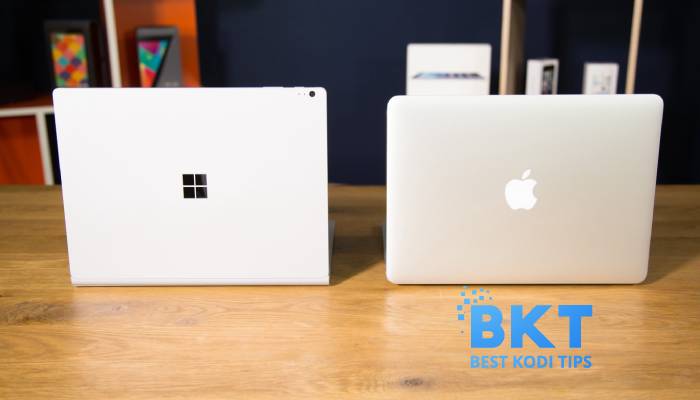When it comes to the types of personal computers we use (PCs), and their proprietary Operating Systems (abbreviated as OS), there are of course some very stark differences among the two dominant brands. Design and hardware specifications notwithstanding, Apple and Microsoft have been direct competitors for decades now. Both brands have always stuck to their own distinctive branding, design, approach and target markets that they cater to. More to the point, there are differences in how each brand approaches internet security.
Apple’s MacOS and Microsoft’s Windows both, have been the undisputed leaders in consumer desktop computing as far as most of us can remember, dominating the market share in the sector. There have been others in the past, such as IBM, and there are niche operating systems such as Linux available today (more of a specialist niche), but they take up tiny bits (less than 3% for Linux) of the market compared to the two giants. Although, regardless of low market share, it is important to note that Linux is remaining steady in this regard and has a loyal following in the tech community. One of the main reasons for this is that Linux is secure.
Coming back to MacOS and Windows, as of July 2020, Microsoft’s desktop OS takes up around 77% of the global desktop market share, while Apple’s is only around 17%. Still, when we look at Apple’s statistics from 2013 to 2020, MacOS has managed to almost triple their market share dominance in the past seven years or so, with Windows giving up almost 15% to them.
So, we’ve covered a general overview and some statistics, but what about the differences in security between MacOS and Windows? Most of us who have been familiar with computers for an extended period of time, and those of us that have used both operating systems know that Apple distinguishes itself from others by promoting how secure (closed-off), and privacy-oriented they are. How do Apple’s offerings stack up with Windows? Let’s explore and compare what both brands offer with regards to security in their desktop OS platforms, below.
Security: MacOS vs Windows
In the last decade, MacOS has proven itself as a worthy competitor to Microsoft’s Windows OS. In popular tech culture, Windows was already globally established in the 90s and well known for ‘viruses’ and other ‘threats’, but Apple’s MacOS was not really in the picture. The general consensus for Macs was (and still is to some extent) that they;
- Cannot get viruses
- Are immune to malware (a term for all software infections)
- Do not ‘freeze’
- Are always reliable and safe
- Have a better ease-of-use than equivalent Windows systems
Well, it wasn’t until quite recently (the last decade or so) that MacOS started having cybersecurity issues. The list below shows software that attackers use to attack both MacOS and Windows, such as;
The above are methods with which online attackers aim to disrupt, destroy or steal information from a computer system. For attackers, or adherents of ‘cybercrime’, the top reasons for ‘hacking’ into something are financial gain, or dominance/control.
Is it True That Macs Have Better Security Than Windows PCs?
The main thing to remember is that Windows has been established, already in the 90s, and much more widely used than MacOS. Since MacOS (as well as the popularity of Apple’s devices) use has jumped especially this decade (think of how many people have Macbooks), cybercriminals are therefore starting to focus more and more attention on targeting MacOS systems. The trends do show that Apple systems will continue to gain popularity and share much more market share with Microsoft in the future, so cyber attacks will be expected.
Still, there are innate differences in security between Windows and MacOS which we need to look at in order to arrive at some conclusions;
MacOS
The good
- MacOS has a stricter approach on hardware security than Windows
- The Safari browser is one of the safest browsers around
- MacOS does not support the windows file system NTFS for file safety
- Apple have developed APFS, their own file system
- MacOS software in most cases is signed by Apple themselves
- Gatekeeper software that checks digital signatures
- Filevault hard disk encryption
- MacOS is based on Unix (BSD) which is inherently more secure
- The MacOS default firewall is excellent
- Apple’s computers have Bootcamp by default, a feature that allows you to run Windows too
The bad
- Still incompatible with a lot of software that is beyond Apple’s control
- MacOS has become more vulnerable to malware recently
- There is not as much free, readily available tech support as on Windows systems
Windows
The good
- Compatible with most software out there
- The ability to use multiple privacy-oriented browsers
- Readily available tech support at every corner
- You can completely customize your security
- A much longer history/experience with malware
- A much larger global user base
- Has good built-in malware protection in Windows Defender
The bad
- Still the leader in malware attacks
- Security risks because of so much third-party software
- Not much in-built hardware security like with MacOS
- Windows has a registry, which can be vulnerable
- Overall a much more ‘open’ operating system
It is true that MacOS is much more closed-off than Windows, and comes with excellent security out-of-the-box. This automatically makes it more difficult for cyber attackers to exploit the system. However, that is not to say that Windows isn’t secure, it’s just that you need to put in more effort into researching and configuring first. The amount of manual work required to ensure a similar level of safety to a Mac is, well, a lot. However, Windows machines are also much cheaper from the get go, more widely used and upgradeable which are huge advantages over MacOS machines.
How To Stay Safe on a Mac And on a Windows PC
So, we have explored some of the key good and bad sides regarding the security of MacOS and Windows operating systems. Let’s remember that no operating system is safe today, certainly old myths (a Mac cannot get a virus) do not apply anymore. Practically every connected device (not only desktop systems, think of the Internet of Things) is now susceptible to malware. Here are some good general practices for anyone using a PC;
- Always peruse the technical support section of the brand that you use and inform yourself of how to stay secure
- Make sure you have legitimate and trustworthy antivirus and anti-malware software installed, no matter which system you are on
- Another key factor is to install a Virtual Private Network, or VPN that will shield your online activity from prying eyes
- Finally, do not forget to update your pc, and never download software you are not familiar with















Comments